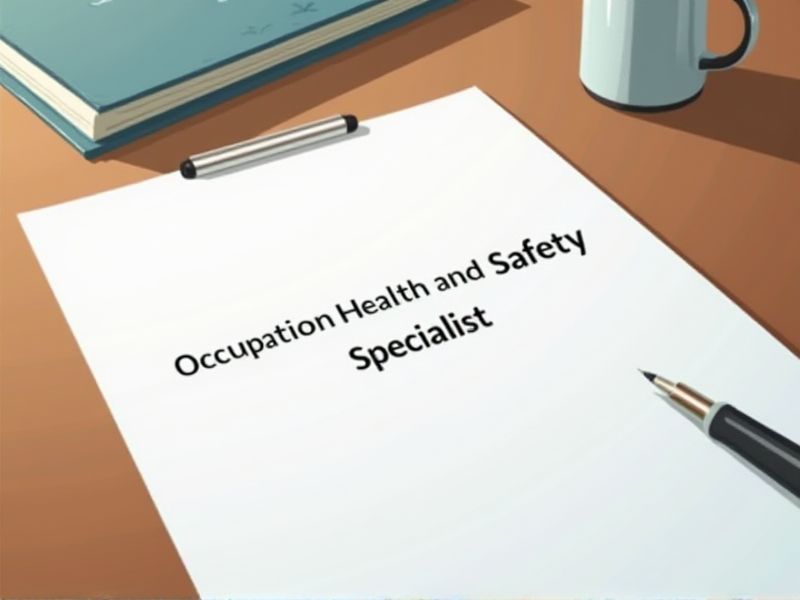
Occupational Health and Safety Specialists play a critical role in ensuring workplace environments are safe and compliant with regulatory standards. Certifications are essential as they provide the required knowledge and skills to effectively identify and mitigate potential hazards. They also demonstrate a commitment to professionalism and staying updated with industry practices. Some key certifications relevant to becoming an Occupational Health and Safety Specialist include those set by recognized institutions.
OSHA 30-Hour General Industry Certification
The OSHA 30-Hour General Industry Certification provides Occupational Health and Safety Specialists with in-depth knowledge of workplace safety regulations, ensuring they can effectively identify hazards. This certification enhances their ability to implement and manage safety protocols, reducing workplace accidents and ensuring compliance with federal safety standards. Possessing this certification demonstrates a commitment to continuous professional development and equips specialists with the tools necessary to educate and train employees on best safety practices. Organizations prioritize hiring certified specialists to mitigate risks and lower potential liability in case of safety incidents.
Certified Safety Professional (CSP)
The Certified Safety Professional (CSP) credential represents a benchmark for competence, enhancing the credibility of Occupational Health and Safety Specialists. With a CSP certification, professionals demonstrate a thorough understanding of risk assessment and mitigation techniques, ensuring safer work environments. Employers often trust CSP-certified individuals more, which can lead to better job opportunities and career advancement. The certification equips specialists with up-to-date knowledge on regulations and safety standards, crucial for maintaining compliance and reducing workplace incidents.
Certified Industrial Hygienist (CIH)
The presence of a Certified Industrial Hygienist (CIH) ensures thorough identification and evaluation of potential workplace hazards. With their expertise, they implement effective strategies to control and prevent employee exposure to harmful substances and environments. Their specialized knowledge contributes to the development of comprehensive safety programs that align with regulatory compliance. The CIH's insights help organizations reduce risk, leading to fewer accidents and health issues among workers.
Associate Safety Professional (ASP)
The ASP certification validates an individual's knowledge and skills, enhancing credibility in the field of occupational health and safety. Employers often require or prefer certified professionals, increasing job opportunities for ASP holders. The certification demonstrates a commitment to safety, encouraging a proactive approach to workplace hazard management. It serves as a stepping stone to further certifications, such as the Certified Safety Professional (CSP), fostering continuous professional development.
Construction Health and Safety Technician (CHST)
Construction Health and Safety Technicians (CHSTs) play a crucial role by providing expertise in job site inspections, ensuring compliance with safety regulations, which reduces the risk of workplace incidents. When CHSTs implement effective safety measures, they help protect workers, which can significantly decrease the frequency and severity of accidents and injuries. Training and guidance from CHSTs lead to better preparation and awareness among workers, fostering a safety-first culture in the construction environment. Employers benefit financially as CHSTs minimize liability risks and potential financial losses associated with accidents and regulatory fines.
NEBOSH International General Certificate in Occupational Health and Safety
The NEBOSH International General Certificate equips Occupational Health and Safety Specialists with globally recognized knowledge, enhancing their ability to identify and mitigate workplace hazards effectively. This certification ensures that specialists are up-to-date with international health and safety standards, which is vital for maintaining compliance and reducing workplace incidents. Employers often seek candidates with NEBOSH certification, as it demonstrates a validated commitment to health and safety practices. The certificate also provides specialists with the skills necessary to implement safety management systems, improving overall workplace safety culture.
Certified Environmental, Safety and Health Trainer (CET)
Certification for Environmental, Safety and Health Trainers (CET) is instrumental in ensuring compliance with industry safety standards. Possessing a CET credential elevates an Occupational Health and Safety Specialist's expertise, enhancing their ability to deliver effective training programs. The specialized knowledge obtained through CET certification fosters improved safety protocols, reducing workplace incidents. Employers often seek CET-certified specialists, as they contribute significantly to creating and maintaining a safer working environment.
Certified Hazardous Materials Manager (CHMM)
A Certified Hazardous Materials Manager (CHMM) enhances an Occupational Health and Safety Specialist's capability to manage hazardous substances effectively. This certification provides specialized knowledge in identifying, handling, and disposing of materials safely, reducing workplace accidents and environmental risks. Improved handling procedures stem from CHMM training, which leads to decreased legal liabilities and compliance with regulations. A CHMM credential increases an organization's trust in their safety protocols, potentially leading to greater organizational safety ratings and employee well-being.
Certified Professional Ergonomist (CPE)
A Certified Professional Ergonomist (CPE) enhances workplace safety by effectively identifying ergonomic risks and mitigating potential musculoskeletal disorders. Their expertise helps in redesigning equipment and processes to improve worker comfort and productivity, reducing injury rates. As CPEs understand the interaction between humans and work environments, they provide solutions that align with safety regulations and ergonomic standards. Employers benefit from decreased compensation costs and increased employee retention due to improved workplace ergonomics facilitated by CPEs.
CPR, First Aid, and AED Certification
Having CPR, First Aid, and AED certification equips Occupational Health and Safety Specialists with the skills to respond promptly to medical emergencies in the workplace, which enhances employee safety. This training ensures that specialists can effectively manage incidents, reducing the risk of severe injury or fatality. Employers benefit from reduced liability and potential costs associated with workplace accidents, as trained staff can mitigate immediate harm. Certification also demonstrates a commitment to maintaining a safe work environment, fostering trust among employees and stakeholders.
Summary
By obtaining certifications, you can enhance your expertise as an Occupational Health and Safety Specialist. You gain credibility, leading to increased trust from employers and peers. Your opportunities for career advancement and higher salaries tend to improve. With certifications, you can apply best practices more effectively, reducing workplace incidents and improving overall safety.
